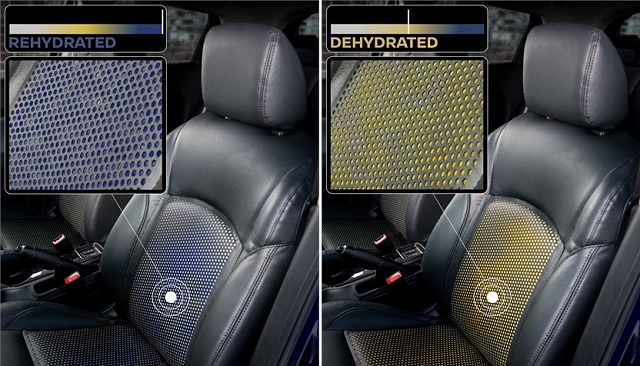Nissan has developed a prototype sweat-sensing car seat which it says could help prevent road collisions.
The technology, called SOAK, has been developed in response to a study conducted in 2015 which suggests that dehydrated drivers are as error-prone as those who have drunk alcohol.
The study, funded by the European Hydration Institute and carried out by Loughborough University, suggests that those who had consumed only a sip of water (25ml) per hour made more than double the number of mistakes on the road than those who were properly hydrated.
The number of errors was equivalent to those displayed by people with a blood alcohol content of 0.08% – the current UK drink-drive limit.
Inspired by the current growth in the wearable technology market, the SOAK car seat changes colour when in contact with perspiration – for example, on a person’s hands or clothes after exercise. When dehydrated the SOAK coating turns yellow, but when rehydrated it turns blue.

While Nissan currently has no plans to bring SOAK into production, it is encouraging drivers to ‘hit the bottle’ – water not alcohol – to raise awareness of the impact dehydration can have on road safety.
Dr. Harj Chaggar, medical consultant for Nissan Motorsport, said: “While many athletes are well-versed on keeping hydrated, many people outside the sporting sphere remain unaware of the impact of dehydration on physiological performance.
“Sweat-sensing technology built into a car is an innovative way of highlighting this, aiding prevention by warning the driver directly.”
nissanPeter Wells, from Cardiff University Business School, told BBC News that measuring additional factors which impede a driver’s ability makes as much sense as monitoring factors which affect the vehicle itself.
Professor Wells said: “This is part of the overall idea that it’s not just about monitoring the car but also the driver.
“This particular application is obviously on the edge of usefulness but it shows a willingness to think more generally about these things and find a way forward.
“I’m not sure that way of showing you are dehydrated is going to appeal to many people – but I like the concept.”
Courtesy of Road Safety GB
